
Illuminati: New World Order (INWO) is an out-of-print collectible card game (CCG) that was released in 1994 by Steve Jackson Games, based on their original boxed game Illuminati, which in turn was inspired by the 1975 book The Illuminatus! Trilogy by Robert Anton Wilson and Robert Shea. An OMNI sealed-deck league patterned after the Atlas Games model was also developed.
Warlords is an out-of-print multi-player fantasy collectible card game published in September 1997 by Iron Crown Enterprises. It is based on material from the video game Warlords III, for which Iron Crown licensed the intellectual property from Strategic Studies Group (SSG). It was designed by a team with Ian Trout of SSG. The 351-card set was sold in starter decks of 60 cards and booster packs of 12 cards. Each of the eight different starter decks consisted of a fixed number of cards related to one of the factions, with the remainder of the cards randomly included from the set of non-faciton cards.
Star Wars: Customizable Card Game (SW:CCG) is an out-of-print customizable card game based on the Star Wars fictional universe. It was created by Decipher, Inc., which also produced the Star Trek Customizable Card Game and The Lord of the Rings Trading Card Game. The game was produced from December 1995 until December 2001. Since 2002, the game has been maintained by the Star Wars CCG Players Committee, with new virtual cards being released every few months and the capability to play both in person and online.

The Star Trek Customizable Card Game is an out-of-print collectible card game based on the Star Trek universe. The name is commonly abbreviated as STCCG or ST:CCG. It was first introduced in 1994 by Decipher, Inc., under the name Star Trek: The Next Generation Customizable Card Game. The game now has two distinct editions, though both forms of the game have many common elements.
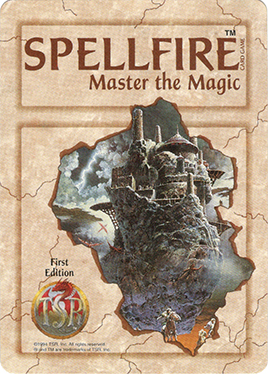
Spellfire: Master the Magic is an out-of-print collectible card game (CCG) created by TSR, Inc. and based on their popular Dungeons & Dragons role playing game. The game appeared first in April 1994, shortly after the introduction of Magic: The Gathering, in the wake of the success enjoyed by trading card games. It was the second CCG to be released, preceding Wizards of the Coast's second CCG Jyhad by two months. More than one dozen expansions for the game were released, and the final expansion was released in October 1997.

A Game of Thrones: The Card Game is an out-of-print collectible card game produced by Fantasy Flight Games. It is based on A Song of Ice and Fire, a series of novels written by George R. R. Martin. The first set was Westeros Edition and was released in August 2002. It has since won two Origins Awards. The game's primary designer is Eric Lang, the lead developer is Nate French, with Damon Stone serving as associate designer.
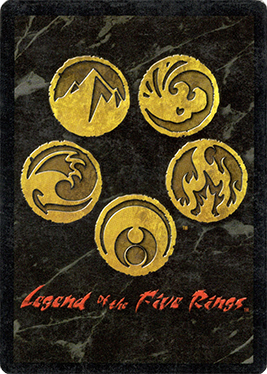
Legend of the Five Rings (L5R) is an out-of-print collectible card game created by a joint venture featuring Alderac Entertainment Group and ISOMEDIA in 1995 and published until 2015, when it was announced that the game would be discontinued for a rules-incompatible successor that will be part of Fantasy Flight Games' Living Card Game line. L5R takes place in the fictional empire of Rokugan from the Legend of the Five Rings setting, where several clans and factions vie for domination over the empire.
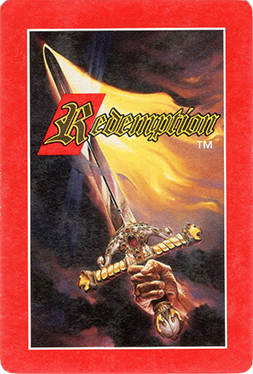
Redemption is a collectible card game based on the Bible. It involves Biblical characters, places, objects, and ideas. The object of the game is for players to use their Heroes to rescue Lost Souls by defeating their opponent's Evil Characters, with the first player to rescue five Lost Souls winning the game. Redemption was first published in July 1995 by Cactus Game Design and its creator, Rob Anderson, continues to develop and produce the game and is the final authority on rulings.
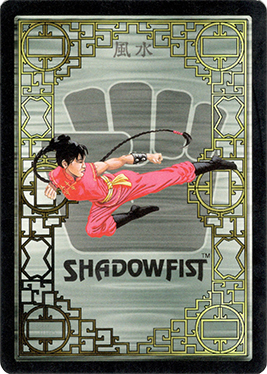
Shadowfist is a card game created by Robin Laws and Jose Garcia. It was released in June 1995 as a collectible card game (CCG), but was shifted to a fixed distribution of cards as of 2013. It shares the same background as Feng Shui, a role-playing game created by Laws and Garcia and released the following year. In September 2018 ownership of Shadowfist transferred to Vetusta Games.
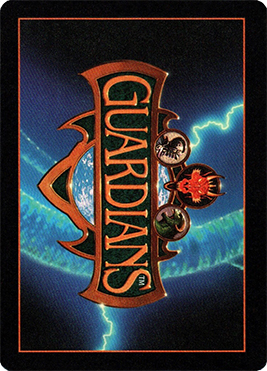
Guardians is a fantasy-themed collectible card game (CCG) published by Friedlander Publishing Group (FPG) in 1995. The initial set was sold in 60-card starter decks and 14-card booster packs.

The World of Warcraft Trading Card Game is an out-of-print collectible card game based on Blizzard Entertainment's MMORPG, World of Warcraft. The game was announced by Upper Deck Entertainment on August 18, 2005 and released on October 25, 2006. Players can play against each other one-on-one, or can join others in order to defeat dungeon/raid "bosses" based on those in the MMORPG. In March 2010, Upper Deck lost the license from Blizzard Entertainment. The license was acquired by Cryptozoic Entertainment later in the month, with the company announcing that planned card sets would be released.

The X-Files Collectible Card Game is an out-of-print collectible card game based on The X-Files fictional universe. The game was developed by NXT Games and published by the US Playing Card Company (USPCC) in 1996. The game was canceled in early 1998.

Galactic Empires is an out-of-print collectible card game with a science fiction theme. It was published by Companion Games in 1994 until the company's bankruptcy in 1997.
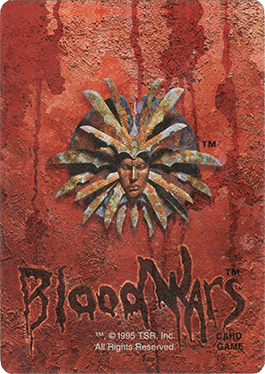
Blood Wars is an out-of-print collectible card game produced by TSR, based on the Planescape campaign setting from Dungeons & Dragons.

Arcadia is an out-of-print collectible card game involving combat and terrain, released in August 1996 by White Wolf, Inc. It is based on Changeling: The Dreaming, a tabletop role-playing game published by White Wolf and part of the World of Darkness series. It focuses on the world of the fae, who are changelings that draw on the dreams of humans. Quests, delineated and represented by cards, are completed by cards similarly representing Characters moving from one Terrain card to an adjacent one until the Quest is completed. The base set was called The Wyld Hunt and was sold only in booster packs. There were two types of booster packs, each with 15 cards: character boosters, which contained character and related cards; and story boosters, which contained cards about game settings, quests, requirements, and effects.

The BattleTech Trading Card Game is an out-of-print collectible card game (CCG) set in the BattleTech universe. The game was developed by Wizards of the Coast (WotC) for FASA and released in 1996. It went out of print after its last expansion, Crusade, in 1998.

Quest for the Grail is an out-of-print collectible card game (CCG) by Horizon Games and Stone Ring in 1995.

Tempest of the Gods is an out-of-print collectible card game by Black Dragon Press and was released in July 1995. The core set, called Limited Edition had 270 cards. It was a limited edition with cards having a gold-coloured border and produced in four rarities, sold in starter decks of 70 cards and booster packs of 15 cards. Signed and numbered cards were randomly inserted into packages.

Echelons of Fire is an out-of-print collectible card game by Medallion Simulations.

Aliens Predator Customizable Card Game is a three-player collectible card game (CCG) that was published in 1997. It was considered one of the more successful CCGs during the late 1990s and was Harper Prism's first foray into the CCG market.


















